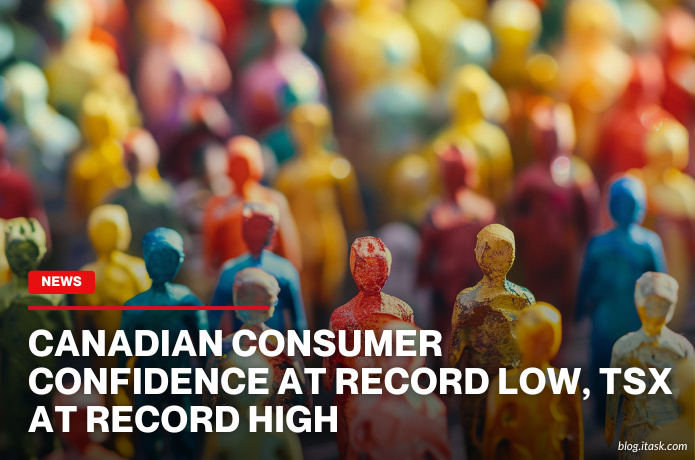Canadian Consumer Confidence At Record Low, TSX At Record High
Canadian Consumer Confidence At Record Low, TSX At Record High

Canadian consumers are feeling unusually worried today, even though the broader economy appears strong. A report from BMO Capital Markets points out that consumer confidence has fallen to a record low, while the Toronto Stock Exchange (TSX) continues to climb to record highs. Despite these worrying feelings among households, the TSX recently hit a new all‑time high and is up about 5 percent so far this year.
BMO’s chief economist, Douglas Porter, notes the unusual mismatch between how anxious people feel and how well the economy is performing. This gap has widened since April, as the TSX rebounded quickly even while consumer worry deepened. Historically, consumer sentiment and household spending have moved together, but more recently they’ve started to diverge, making it harder to rely on those surveys as economic indicators.
The Consumer Confidence Index, tracked by the Conference Board of Canada, plunged to just 44.2 percent in March after dropping 8.4 points the previous month, marking its lowest level ever recorded. That sharp decline reflects growing worries over rising costs, trade tensions, political uncertainty, and the challenge of buying essentials in a high‑price environment.
On the other hand, household spending remains solid. BMO estimates that real household spending grew by around 3 percent year over year in the first quarter of 2025. In April, retail sales rose another 0.5 percent, showing that despite concerns, people are still shopping and consuming. This split between dismal sentiment and healthy spending raises questions about how much consumer surveys reflect feelings versus actual behavior.
Porter and BMO economists warn that if sentiment doesn’t improve, consumer caution could become a self‑fulfilling prophecy. Even if real conditions remain solid, people may cut back on spending out of fear, which in turn could slow the economy and create the recession they dread. This makes managing public mood a key task for policymakers and economic leaders.
In short, Canada faces a strange mix of strength and fear: equity markets hover at historic highs, while households report historic lows in confidence. The gap between data and feeling suggests policymakers should not ignore how people feel—and that restoring confidence may be just as important as managing metrics. Anxiety now casts a shadow on economic optimism that, unchecked, may turn fears into reality.
